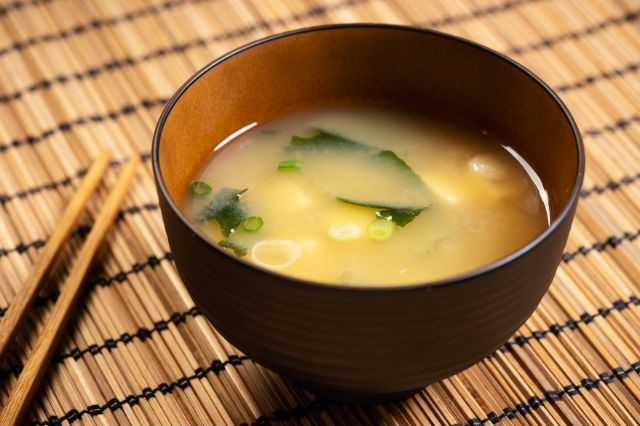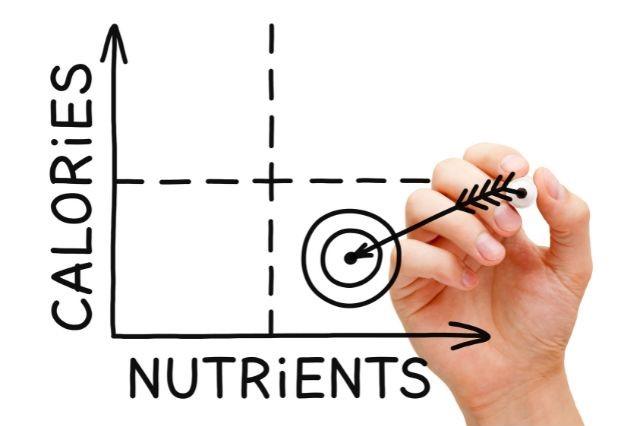Is Miso Soup Good For Weight Loss?
This post may contain affiliate links which means I may receive a commission for purchases made through links at no extra cost to you. See my disclosure policy for more information.

If you are here you have for sure crossed paths with the delicious Miso Soup. But you might be curious, though – is miso soup good for weight loss?
In simple terms, yes, it potentially can. Miso soup, with its low-calorie count and high protein content, has the ability to leave you feeling full and satisfied, which can be a plus when you’re aiming for a calorie deficit to lose weight.
But, it’s not just a matter of calories – there’s a wider picture to consider.
So, hold off on that impulse to stockpile miso paste! Before diving into miso soup’s role in your weight loss journey, it’s important to understand what’s in it and why it’s special.
Then, we can look at practical ways to incorporate it into a balanced diet, and even explore how to whip up your own homemade miso soup.
Does that sound interesting? Great! Stick around as we take a comprehensive, objective look at all things Miso soup.
Understanding Miso Soup
Miso Soup, a staple in Japanese cuisine, is renowned for its distinctive, savory taste, primarily attributed to its star ingredient – miso paste. So, what exactly is in this popular soup, and how do the ingredients contribute to weight loss? Let’s dissect this flavorful dish:
Miso Paste: The heart of Miso Soup, miso paste, is a fermented soybean paste packed with protein. Proteins have a higher satiety value, which means they keep you fuller for longer. This fermented paste is available in several varieties, with red miso paste being one of the more common types.
Tofu: This is a low-fat, high-protein food that adds substance to the soup.
Green Onions: These add a pop of color and flavor to the soup, but they’re not just there for aesthetics. Green onions are low in calories but rich in vitamins A and C, which support a healthy immune system.
Seaweed: Often included in traditional Miso Soup recipes, seaweed is low in calories but high in vitamins and minerals. It also contains a type of fiber called alginate, which has been studied for its potential to increase feelings of fullness.
Dashi: This is a type of broth used as a base in Miso Soup. It’s made from dried kelp and bonito flakes, adding depth of flavor without adding significant calories.
While each of these ingredients contributes to making Miso Soup a healthy choice, the key to weight loss lies in its overall low-calorie profile and its potential satiating effect. This is why you may be curious about whether you can drink Miso Soup to support your weight loss efforts.
Miso Soup Nutrition facts
As per the USDA 1 cup of miso soup contains the following nutrients.
Serving size: 1 cup (240 ml)
Calories: 79.2 kcal
Fat: 3.7 g
Total carbs: 5.9 g
Net carbs: 5 g
Fiber: 0.9 g
Protein: 5.9 g
Making Miso Soup
Making Miso Soup at home is a simple and straightforward process. Here’s a basic miso soup recipe for you to start with:
Ingredients:
3 cups of water
2 tablespoons of miso paste (white or red)
1/2 cup of diced tofu
1/2 cup of chopped green onions
1/2 cup of seaweed (wakame)
Instructions:
1. Soak the Seaweed
Start by soaking the seaweed in a bowl of water. It will expand and soften in about 15 minutes.
2. Prepare the Dashi
While the seaweed is soaking, you can start on the soup. Traditionally, Miso Soup begins with dashi, a simple Japanese broth. For a quick version, you can heat the water on medium heat.
3. Add the Miso Paste
Once the water is heated (but not boiling), lower the heat and add the miso paste. The easiest way to do this is to put the miso paste into a small strainer. Lower the strainer into the pot, and use a spoon to dissolve the paste into the water.
4. Incorporate the Other Ingredients
After the miso paste is fully dissolved, you can add the diced tofu and the soaked, drained seaweed to the pot. Let the soup simmer for a few minutes to allow the flavors to meld together. Make sure to keep the heat low to avoid boiling the soup, as this can affect the miso’s flavor and kill the beneficial probiotics.
5. Finish with Green Onions
Just before serving, add the chopped green onions for a fresh, vibrant finish.
Miso Soup and Weight Loss: Why Drink Miso Soup for Weight Loss?
The idea of sipping on a bowl of Miso Soup in your weight loss diet might seem too good to be true. Yet, there’s some science behind what makes miso soup healthy for weight loss. Let’s delve into the why and how of it.
Low in Calories, High in Nutrition

A key component of any successful weight loss plan is achieving a calorie deficit — consuming fewer calories than your body uses. One way to help achieve this is by incorporating low-calorie, high-nutrition foods into your diet, and Miso Soup ticks both of these boxes.
The main ingredient, miso paste, is rich in protein, vitamins, and minerals. Miso Soup calories from one cup are pretty low at around 79 kcal. This makes miso soup a healthy choice that can easily fit into most diet plans without causing a calorie overload.
The Satiety Factor

Protein and fiber are two key nutrients when it comes to feelings of fullness or satiety.
As I said before, Miso Soup, with its high-quality protein from the miso paste and tofu, and fiber from ingredients like seaweed, can help keep you satisfied much as an egg salad might.
This is why some diet plans suggest you drink miso soup every day before a meal to curb your appetite and prevent overeating, aiding your weight loss journey.
Fermented Foods and Gut Health

Miso paste, being a fermented food, is rich in probiotics. While research is still ongoing, some studies suggest that a healthier gut can play a role in managing weight.
The probiotics in the miso paste may aid digestive health and could potentially assist in weight management, although more research is needed in this area.
Easy to Incorporate into Your Diet

One of the great benefits of Miso Soup is its versatility and convenience similar to a chai tea that could contribute to your weight loss journey. Instant Miso Soup provides a quick, convenient, and potentially healthier alternative to other ready-made meals, making it easier to avoid buying unhealthy takeout food.
While homemade instant miso soup takes a bit more time, it allows you full control over the ingredients and sodium levels.
A Plethora of Variations

Miso Soup is adaptable offering the same versatility as a Caprese salad in a weight-loss diet. Feel free to add healthy ingredients like mushrooms, other types of vegetables, or different types of miso like red miso paste to vary the taste and nutritional content.
This prevents diet boredom, making it easier to stick to your weight loss plan.
Also read: Is Broccoli Good for Weight Loss?
Practical Tips for Incorporating Miso Soup into a Weight Loss Diet
Adding Miso Soup to a weight-loss diet is not just about drinking it whenever you feel like it, but about optimizing the way you consume it. Here are some specific, practical tips to make incorporate miso soup for weight loss.
Start Your Meal with Miso Soup
Drinking miso soup before your main meal can be a good strategy for weight loss. The soup’s volume and high water content may help you feel fuller, thereby potentially reducing your calorie intake during the meal.
In Japanese tradition, Miso Soup is often served at the start of a meal to stimulate digestion and prepare the stomach for the main course.
Add More Veggies
Enhance the nutritional profile of your Miso Soup by adding more vegetables.
Not only will this make your soup more filling, but it will also increase the fiber content, which has been associated with better weight management.
You can add ingredients like mushrooms, bok choy, or spinach for an extra healthful punch.
Control Your Sodium Intake
While miso paste does contain beneficial nutrients, it’s also high in sodium.
When preparing your miso soup, try to limit the amount of miso paste or opt for lower-sodium versions to maintain a healthy balance.
High sodium intake can lead to water retention, which could affect your weight loss progress.
Experiment with Different Types of Miso
Miso comes in several types, including red, white, and mixed miso. Each type has a different flavor profile and nutritional content.
For instance, red miso paste is typically saltier and richer in flavor compared to white miso. By trying different types of miso, you can find one that best suits your taste and dietary needs.
Be Mindful of Add-Ins and Toppings
While it’s tempting to elevate your Miso Soup with additional ingredients, be mindful of its calorie content.
Ingredients like fatty meats or crunchy fried onions can quickly turn your low-calorie Miso Soup into a calorie-dense meal.
Opt for lean proteins like tofu or chicken, and healthy toppings like green onions or seaweed.
Opt for Homemade Instant Miso Soup
Pre-packaged instant miso soup can be high in additives and sodium. A healthier alternative is making your own homemade instant miso soup.
You can prepare it in batches and store it in the fridge. This way, you always have a quick, healthy, low-calorie option on hand, making it easier to stick to your weight-loss diet.
Also read: Are Mushrooms Good for Weight Loss?
Considerations and Cautions when Including Miso Soup in Your Diet
While Miso Soup can be an excellent addition to a weight loss diet, it’s essential to consider certain factors to ensure it supports your health and weight loss goals in the best way possible. Let’s take a closer look:
High Sodium Content
Miso paste, the primary ingredient in Miso Soup, is high in sodium due to its fermentation process.
While sodium is an essential nutrient, too much can lead to issues like high blood pressure and water retention, which may hinder weight loss.
Always be mindful of the quantity of miso paste you use and consider incorporating low-sodium versions.
Quality of Ingredients
What makes instant miso soup healthy are its quality ingredients. Some instant miso soups may contain additives, preservatives, and high levels of sodium.
When making it at home choose a healthier instant miso soup without additives, and opt for fresh, organic ingredients whenever possible.
Potential Allergenicity
Miso soup’s main ingredient, miso paste, is made from fermented soybeans. Soy is a known allergen, and some individuals may experience adverse reactions to it. If you have a soy allergy, it’s best to avoid miso soup.
Serving Size
While Miso Soup is low in calories, consuming large portions can still contribute to a surplus of calories over time, which could counteract your weight loss efforts. Be mindful of your serving sizes, and remember that it’s part of your meal, not the meal itself.
Variety in Diet
While incorporating Miso Soup into your weight loss plan can be beneficial, it’s important to maintain variety in your diet.
Relying solely on miso soup for weight loss or going on a miso soup diet can lead to nutrient deficiencies. Ensure you’re consuming a wide range of foods from all food groups to meet your nutritional needs.
Conclusion
So, to wrap things up, is Miso Soup good for weight loss? It appears so, thanks to its low-calorie content, satisfying nature, and high nutritional value. However, it’s essential to remember that drinking Miso Soup alone won’t make the pounds magically drop off. It’s just one part of a balanced diet
FAQ
Is it OK to drink miso soup everyday?
In general, it’s perfectly fine to consume miso soup daily as long as you pay attention to your overall sodium intake. Miso soup is rich in essential nutrients, and it’s part of the daily diet in many Japanese households. However, miso paste is high in sodium, so if you’re watching your salt intake or have conditions like high blood pressure, you should consider limiting your consumption or opt for a low-sodium version.
Is miso soup the healthiest soup?
Labeling any single soup as the “healthiest” can be misleading since the healthfulness of a soup can depend largely on its ingredients. That being said, miso soup is indeed very healthy. It’s low in calories, rich in essential nutrients, and offers potential health benefits from its fermentation process. However, other soups can also be very healthy, particularly those that are loaded with vegetables, and lean proteins, and are prepared with minimal added fats or sodium.
Is miso soup an appetite suppressant?
Miso soup could potentially help to suppress appetite, thanks to its high water and protein content. Studies suggest that consuming soup before a meal can lead to a lower total calorie intake, aiding weight loss. The exact mechanism behind this isn’t fully understood, but it could be due to the soup’s liquid content and its potential to create a feeling of fullness.
Does miso soup cleanse your body?
While the idea of “cleansing” or “detoxifying” the body is a controversial subject in the scientific community, it’s true that miso soup can support overall health in various ways. Its fermented nature means it contains probiotics, which can support gut health and immune function. Plus, it’s hydrating and filled with nutrients. However, it’s not accurate to say that miso soup, or any other food, can cleanse the body in the way that many “detox” products claim to. Our bodies naturally detoxify harmful substances through organs like the liver and kidneys. A balanced diet and a healthy lifestyle can support these natural processes.
This post may contain affiliate links which means I may receive a commission for purchases made through links at no extra cost to you. See my disclosure policy for more information.
Rahul is a professional nutritionist certified by the International Sports Sciences Association (ISSA) and a personal trainer certified through the American Council of Exercise (ACE). He has a special interest in the science of nutrition and how it can impact the body.
